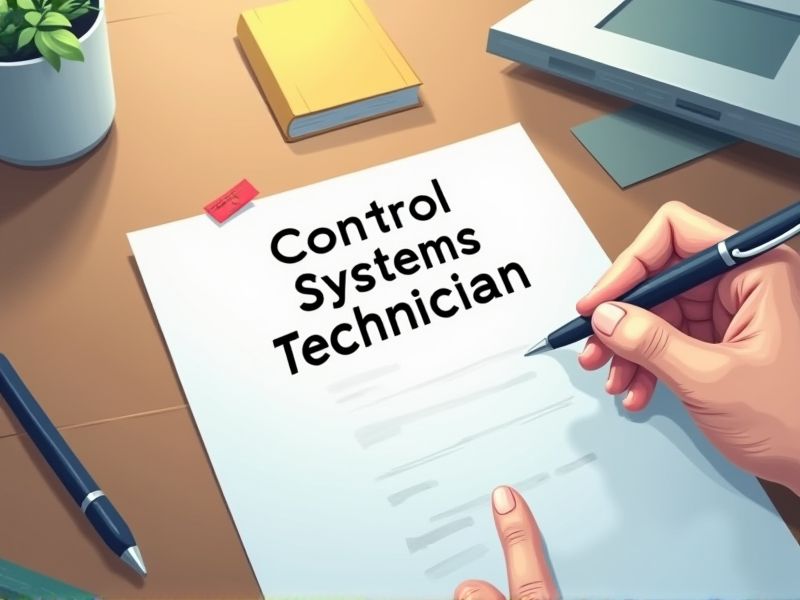
Control Systems Technicians play a vital role in maintaining and optimizing automated systems that are critical to industrial processes. Certifications demonstrate proficiency in specialized areas such as PLC programming, instrumentation, and network protocols, ensuring technicians can handle complex control systems. They also serve as a benchmark for employers to gauge technical competence and commitment to ongoing professional development. These are some crucial certifications you may require as a Control Systems Technician.
ISA Certified Control Systems Technician (CCST)
The ISA Certified Control Systems Technician (CCST) designation signifies a technician's competency and proficiency in calibrating, troubleshooting, and managing control systems, which builds trust with employers. As industrial automation becomes more complex, having a CCST can enhance a technician's ability to effectively maintain system integrity. Earning the certification can often lead to better job prospects and potentially higher salaries, as it demonstrates advanced industry knowledge and skills. The CCST certification also ensures that technicians stay updated with technological advancements in the field, which is crucial for maintaining efficient operations in various industries.
Rockwell Automation Certified Programmer (ControlLogix)
A ControlLogix Certified Programmer provides expertise in programming and troubleshooting Allen-Bradley's PLCs, crucial for efficient control systems management. Certification ensures a technician understands complex system integration, reducing potential downtime due to errors. The credential signifies proficiency in using Rockwell Automation's tools, which can be vital for industries relying on precise automation controls. Hiring certified professionals can lead to improved system performance and increased safety compliance in automated environments.
Siemens S7 PLC Programming Certification
Earning a Siemens S7 PLC Programming Certification validates a technician's ability to effectively program and troubleshoot Siemens S7 controllers, crucial for maintaining efficient industrial automation. This certification often leads to increased job opportunities as many industries rely on Siemens technology for their control systems. Employers tend to prioritize certified individuals as they demonstrate a standardized level of knowledge and expertise. Certification also supports career advancement, positioning technicians as experts within their field, which can translate to higher earnings.
ABB Industrial Automation Certification
Control Systems Technicians require ABB Industrial Automation Certification to ensure proficiency in handling ABB's sophisticated automation technology, which enhances operational efficiency. This certification verifies their expertise, reducing the risk of errors in system installation and maintenance. With ABB's technologies prevalent in various industries, certified technicians become more competitive in the job market. Certification also aligns with industry standards, assuring employers of the technician's capability to manage and troubleshoot complex automated systems effectively.
CompTIA A+ Certification
Employers often seek a CompTIA A+ Certification for Control Systems Technicians because it validates fundamental IT knowledge essential for integrating and troubleshooting digital systems. Control systems increasingly involve computer networks and software; thus, understanding IT infrastructure is crucial. A certified technician can effectively manage hardware and software issues in control systems, reducing downtime. The certification enhances job prospects by assuring employers of the technician's competency in dealing with IT-related aspects of control systems.
CompTIA Network+ Certification
Control Systems Technicians often work with complex networked systems, and the CompTIA Network+ Certification provides foundational networking knowledge essential for understanding these systems' interconnectivity. Employers recognize this certification as a benchmark for validating baseline skills in network configuration and troubleshooting, directly impacting a technician's ability to manage system issues efficiently. By gaining competence in network security, essential for protecting control systems, technicians ensure minimal downtime and safeguard critical infrastructure. Mastering these networking concepts enables technicians to optimize communications between devices, leading to more robust and reliable control environments.
Cisco Certified Network Associate (CCNA)
A Control Systems Technician requires CCNA certification because it provides a foundational understanding of network principles crucial for managing industrial network environments. Enhanced knowledge of IP addressing and routing protocols is essential for integrating and troubleshooting communication systems across devices. CCNA equips technicians with skills to secure network architectures, a critical task in safeguarding industrial control systems against cyber threats. Mastery in network automation gained through CCNA aids in streamlining operations, increasing efficiency in complex control systems.
OSHA 10/30-Hour General Industry Safety Certification
OSHA 10/30-Hour General Industry Safety Certification is needed for Control Systems Technicians to ensure they understand workplace safety standards, reducing the risk of accidents. The certification empowers technicians with knowledge on how to identify hazards related to control systems, promoting a safer work environment. With comprehensive training on health regulations, technicians can effectively mitigate risks associated with electrical and mechanical systems. Adherence to OSHA guidelines is necessary for compliance with industry regulations, enhancing the overall safety culture of industrial workplaces.
NFPA 70E Electrical Safety Certification
NFPA 70E Electrical Safety Certification is needed for a Control Systems Technician to ensure they understand and implement safe work practices around electrical hazards. This certification reduces the risk of electrical injuries by providing guidelines on safe distances and proper protective equipment. When technicians are trained in these standards, they contribute to lowering workplace accidents and associated costs. Compliance with NFPA 70E also fulfills regulatory requirements, which helps a company avoid potential fines and legal issues.
Lean Six Sigma Yellow Belt Certification
Control Systems Technicians may benefit from Lean Six Sigma Yellow Belt Certification as it provides fundamental skills in process improvement, which can enhance operational efficiency. Understanding Lean Six Sigma principles aids in identifying and minimizing sources of variation in control systems. This certification helps technicians apply data-driven decision-making, leading to more precise and reliable system performance. Improved problem-solving capabilities from this methodology can lead to reduced downtime and maintenance costs.
Summary
When you obtain certifications as a Control Systems Technician, your marketability increases significantly. Employers can perceive you as more skilled and knowledgeable, leading to project opportunities. This recognition often results in higher salary potential and job stability. Overall, certified professionals tend to have a competitive edge in career advancements.
